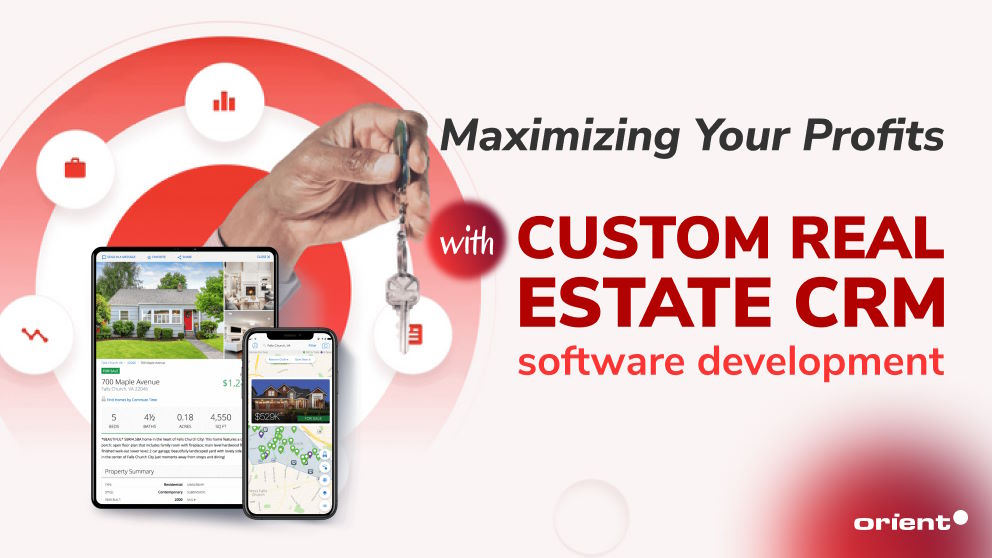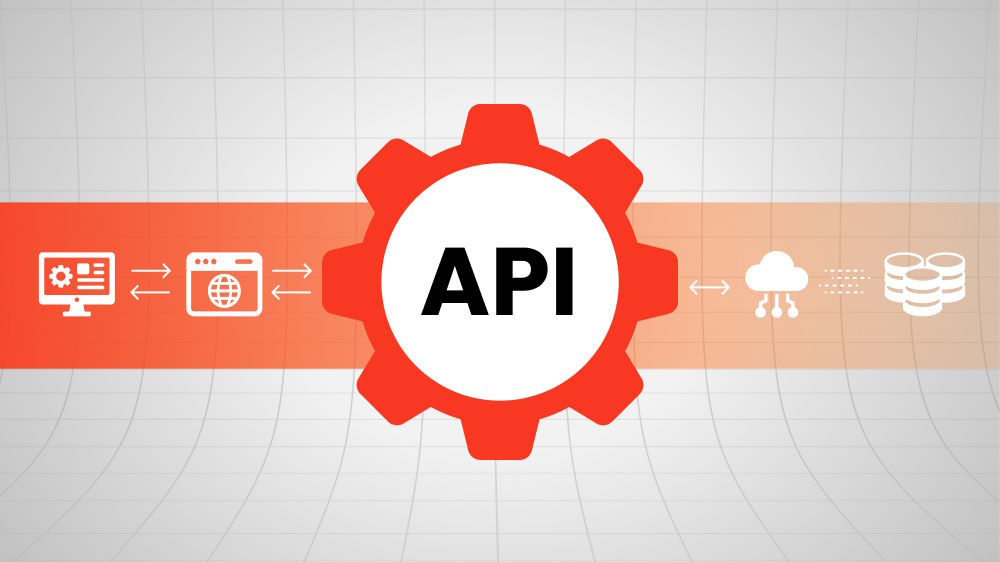Maximizing Your Profits with Custom Real Estate CRM Software Development

Content Map
More chaptersData collection in the real estate industry is crucial. Having the right data in hand allows real estate professionals to make confident and informed decisions regarding some of the most important aspects of the job, like purchases, sales, or the development of properties. Good data provides insights into market trends. Good data gives businesses a competitive edge.
Data collection alone, however, isn’t sufficient without proper data management. This is where real estate customer relationship management (CRM) steps in. A CRM system gathers, organizes, and maintains all customer-related data so that you can improve the customer experience and enhance data management.
There are numerous commercially available CRMs, and you can always choose one to assist in your real estate business operation. However, if the off-the-shelf software isn’t meeting all your needs, then a custom real estate CRM software development is just what you need. A custom real estate CRM is the key to keeping the data quality consistent across your organization.
What Is Real Estate Customer Relationship Management Software and How Do They Work?

A customer relationship, management, or CRM system in the real estate industry is a tool that facilitates the management of all communication between agents and their clients. It is a central database that allows you to manage your real estate business from anywhere in the world since data resides in a cloud-based environment. Every real estate CRM system is unique, but in general, the system is expected to support the following functions:
- Managing real estate leads
- Monitor the buyer journey for each customer you contact
- Tracking lead generation campaigns and marketing campaigns
- Contact management
- Uploading documents and contracts
- Managing calendars
- Maintaining up-to-date real estate trends
- Provide seamless access to different real estate leads website
- Marketing automation, etc.
CRM tools have become increasingly important to the daily operations of real estate agents as well as the success of the business.
Types of Real Estate CRM Software

Depending on your needs, there are two types of real estate CRM solutions to implement: custom CRM software and off-the-shelf CRM software.
Off-the-shelf CRM
Off-the-shelf CRM, sometimes referred to as box solutions, are software solutions that are already built, ready to use, and often contain basic functionality. These solutions typically include standard business processes and are not tailored to a particular market or industry.
This kind of CRM software is quick to deploy, costs less, and your provider is always ready to support you. However, due to its generic features, its features might not always meet your needs, and scaling up is going to be challenging.
Custom CRM
As the name suggests, custom CRM solutions are tailor-made to a business’s unique needs. Thus, it can be integrated seamlessly into the existing systems, maximize efficiency, and help workflow across multiple departments or branches stay consistent.
However, you’ll have to pay more upfront, and the development time for a custom CRM will be much longer.
When Is Custom Real Estate CRM Software Right for You?

You have conducted an in-depth analysis of the real estate CRM software market. However, you are uncertain whether to purchase a commercial-grade CRM system or construct one from the ground up. All the information can be overwhelming, so we have condensed the three signs that a custom CRM solution is the best choice for you.
There Are Unique Business Needs
Before buying a ready-made solution or building one from scratch, make sure you have made up your mind about what you want to do with the CRM system. From there, work out the must-have features of your desired CRM system. If off-the-shelf solutions cannot meet your unique business needs, it is best to build your CRM.
You Are Not Willing to Adapt Your Business Processes to A Commercial Real Estate CRM
A lot of real estate companies rely on a number of core software and systems to run the business. Not every commercial CRM can be seamlessly integrated into an existing system, so if your goal is to create a cohesive tech ecosystem, a tailor-made CRM is the best option.
You Want to Scale Up the Software the Future
If you already have growth in mind, off-the-shelf CRM systems are not the best choice. It is much harder for this kind of CRM software to accommodate your needs for increased data volume or user accounts.
Custom CRM solutions are ready to handle large traffic, changing requirements, or feature updates without compromising performance.
Why You Need Real Estate CRM Software

Investing in real estate custom CRM software is worthwhile, as you will soon realize it pays off in the long term.
No Lead Leakage
It can be difficult to respond to your customers in time if their data is scattered anywhere - social media, phone call logs, websites, exhibitions, and so on. Being slow to respond to them leads to lead leakage and eventually negatively impacts your brand reputation. Also, keep in mind that the first businesses to respond to a customer win up to 78% of the deals. The right CRM software helps real estate agencies with lead management and significantly increases the chances of sealing the deal.
Task Automation
One of the largest benefits of having a CRM solution in place is the automation of business processes. The tedious and repetitive tasks are taken care of by the CRM system. For example, any leads collected via the website are automatically logged into the CRM system. Phone calls and email interactions are also noted down. New customers receive automatic welcome letters. These seemingly trivial tasks eat up a large chunk of time each day. Having them automated frees up time for the brokers and boosts customer retention.
Customer Insight
Having a centralized database means you have all the necessary data to do customer profiling. This involves their purchase history, demographic data, and even psychological profiles to help you gain a deeper insight. Analyzing this data allows you to understand their behaviors, patterns, and their purchase motivation to create more personalized marketing campaigns.
Nonetheless, analyzing a large volume of data is time-consuming and even intimidating. With the help of artificial intelligence (AI), you’d be able to perform more accurate data analytics, segment customers better, and build a better rapport with your target audience.
Fast and Accurate Report Generation
There is a plethora of documents real estate businesses need to take care of. Contracts, deeds, and closing statements are only some of them. Having CRM software means you already have all the crucial documents available in the system. Most CRM systems allow you to pull the necessary data from the CRM contact’s account information. Gone are the days of manually going through pages and pages of lengthy documents with the fear of wrong data entries.
Key Features of Real Estate CRM Software
No two real estate CRM software are the same. However, there are core functions that every real estate company needs to keep in mind. By selecting custom CRM development, the user will have complete control over the core functions of the software.
Contact And Lead Management
Every CRM software should have a module to manage leads, prospects, clients, and partners, whether it is via phone calls, emails, or social media messages. Other nice-to-have features in this module are the contact history, filters, automatic saving, and email templates.
Automated Lead Capture
Effective data management should go with an automated lead capture module to ensure lead leakage doesn’t happen. This means lead sources - websites, social media, etc. - are integrated into the software.
Property Tracking
Property tracking is another must-have feature. Real estate companies should be able to quickly and easily track the property’s listing, description, photos, and status. Integration with Multiple Listing Services (MSL) will make any agent’s life much easier.
Reporting And Analytics
Automated reports and data analytics give you insights into team performance and customer communications. Get insights into lead conversion rate, sales performance, and other important metrics. You can make timely changes, make informed decisions, and even submit them to your board of directors.
Integration With Third-Party Systems
Your CRM tool of choice should be able to seamlessly integrate your core tools and systems like accounting software, MSL listings, marketing software, etc.
Task Management and Appointment Management
You can rest easy that your agent will be on time with an easy-to-use task and appointment tracking system. To help you manage your time efficiently and ensure that no deadlines are missed, your system should offer notifications, set deadlines, and set reminders.
Document Management
As mentioned earlier, every agent needs to keep track of mountains of documents at the time. The ability to securely store and customize paperwork saves companies a lot of time while ensuring the accuracy of the documents.
Pipeline Management
A pipeline is a series of steps that take place prior to, during, and following the sale of a property. A visual representation of the sales pipeline, consisting of the stages of pending deals, facilitates easy and efficient tracking.
AI Chatbots
Staff are not always around to respond to customer’s queries. It is not a good idea to keep your customers and prospects waiting. Having an AI-powered chatbot onboard maintains customer satisfaction while ensuring that 80% of clients’ frequently asked questions are still answered.
A Custom CRM System - Why Not?
CRMs are now widely utilized by real estate companies. However, it can be difficult to find one CRM software that fits your business demands down to the ground. Why not opt for custom CRM software - after all, it is a future-proof solution as it grows alongside your business.
CRM systems take away the costly overhead in the daily business processes and allow you to focus on building customer rapport and other value-driven activities. It is recommended to entrust the development of CRM software to experienced professionals and to select reliable development services from firms with customer-friendly records, such as Orient Software. If you would like to learn more about how to create your own custom CRM software, drop us a line, and we are more than happy to help!







